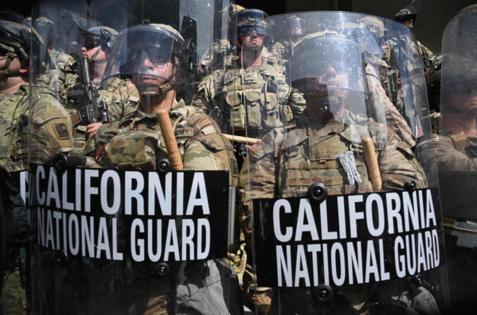Trump's Guard deployment in LA broke federal law, judge in California Gov. Gavin Newsom's suit rules
Published in News & Features
SACRAMENTO, Calif. — A federal judge in San Francisco ruled Tuesday that President Donald Trump and Defense Secretary Pete Hegseth violated federal law by deploying California National Guard troops to Los Angeles during a summer standoff with Gov. Gavin Newsom over immigration raids.
U.S. District Court Judge Charles Breyer concluded that the Trump administration’s actions in June breached the Posse Comitatus Act, an 1878 statute that generally bars use of the military to enforce domestic laws.
In a 52-page decision, Breyer found that federalized troops were used in direct support of immigration raids, including setting up perimeters and assisting with apprehensions — crossing a legal line intended to preserve the civilian nature of law enforcement.
Trump and Hegseth deployed roughly 4,000 California National Guard members to the Los Angeles area following protests in response to immigration enforcement operations. Some of the protests were violent.
“The evidence at trial established that Defendants systematically used armed soldiers (whose identity was often obscured by protective armor) and military vehicles to set up protective perimeters and traffic blockades, engage in crowd control, and otherwise demonstrate a military presence in and around Los Angeles. In short, Defendants violated the Posse Comitatus Act,” Breyer wrote in his decision, which is expected to be appealed to the 9th Circuit U.S. Court of Appeals.
Breyer’s ruling followed a multi-day bench trial in which attorneys for California argued that the troops’ roles exceeded protective support and ventured into active law enforcement.
He cited public statements by Trump and Hegseth indicating plans to federalize Guard troops in other cities, “thus creating a national police force with the President as its chief.” He issued an injunction barring further violations, writing that “there is an ongoing risk that defendants will act unlawfully.”
Meghan Strong, the lawyer representing the state of California, said the judge needed to step in to make sure proper boundaries were in place.
Eric Hamilton, arguing for the U.S. Department of Justice, contended the soldiers were present to defend federal workers and not to conduct arrests or enforce laws.
But the ruling was “narrowly tailored,” Breyer wrote: “The injunction applies only to Defendants’ use of the National Guard in California, not nationally. Defendants are not required to withdraw the 300 National Guard troops currently stationed in Los Angeles, nor are they barred from using troops consistent with the Posse Comitatus Act. In fact, the Court essentially just orders Defendants to follow the (unedited) training materials that they introduced in this trial.”
Newsom’s office, on X, posted a screenshot of that part of the ruling, and wrote, “The people of California won much-needed accountability against Trump’s ILLEGAL militarization of an American city!”
“Today’s ruling affirms that President Trump is not King, and the power of the executive is not boundless,” Attorney General Rob Bonta said in a statement. “For more than two months, the President has engaged in political theater, using National Guard troops and Marines as pawns to further his anti-immigrant agenda. In doing so, he trampled on one of the very basic foundations of our democracy.”
The White House did not immediately respond to a request for comment.
Breyer did not order the withdrawal of troops still in California but directed the administration to cease any use of military personnel for civilian law enforcement tasks moving forward.
The ruling represents a blistering rebuke of presidential authority in the context of domestic military deployment and may shape how future administrations interpret the Posse Comitatus Act.
Breyer, who was appointed by former President Bill Clinton, ruled in June that Trump had exceeded his authority by not ordering the California National Guard deployment through Newsom . Breyer called on Trump to return control of the troops to the governor.
An appeals court, also in June, overturned the judge’s ruling, saying that Newsom did not have power to veto Trump’s order and that the president would likely win on those grounds “because the alleged procedural violation has no effect on President Trump’s authority.”
When Breyer issued that first decision it was less than a week after troops were called to the Los Angeles area and he did not rule on if the federal government was violating the Posse Comitatus Act. That set the stage for the most recent trial.
About 300 National Guard soldiers have remained in the Los Angeles area since Aug. 1.Newsom has called on Trump to allow them to leave.
The Pentagon had argued that the Guardsmen’s footprint has shrunk since their initial 5,000-strong appearance in June, a point Breyer said “was not well taken.” Those soldiers are set to remain in Los Angeles through November.
____
©2025 The Sacramento Bee. Visit at sacbee.com. Distributed by Tribune Content Agency, LLC.







Comments